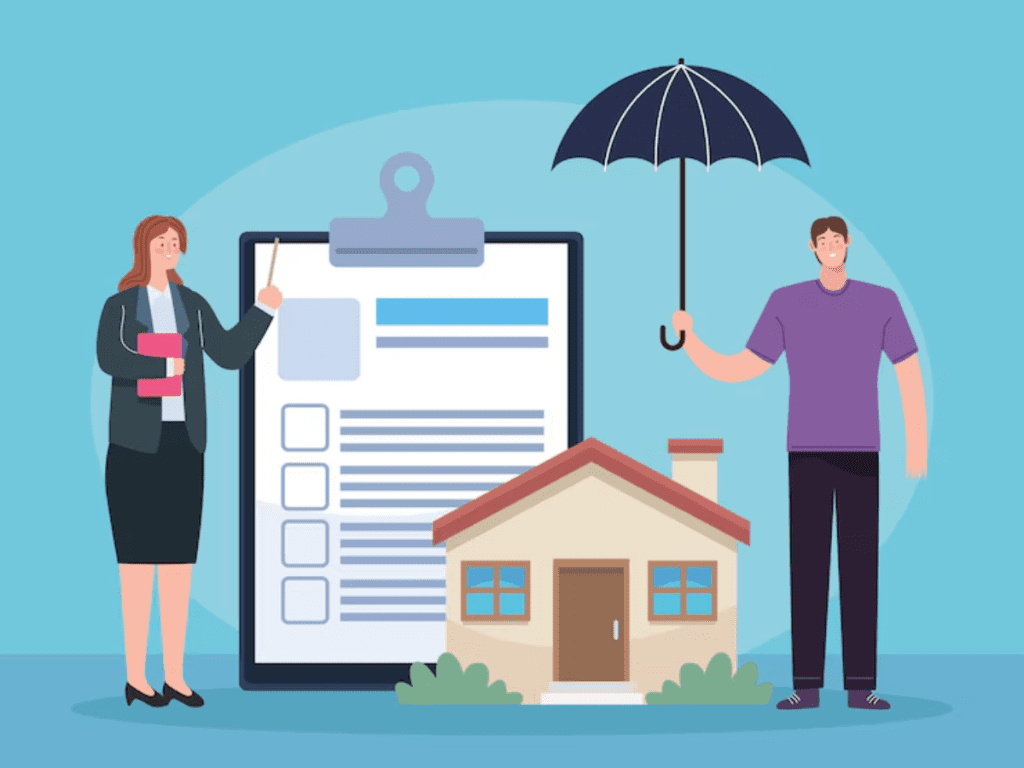Introduction
Home insurance is essential for insulating homeowners from the surprise costs that occur due to damage, loss, or theft of property. Being covered can reassure homeowners that their property and possessions are insured against every hazard. But most homeowners commit common errors that can leave them underinsured or without protection during the worst times. Being aware of these errors and how to prevent them is the key to making sure your home insurance policy covers you with the needed protection. We will discuss the most common home insurance errors in this article and provide insights on how to prevent them.
Failing to Understand Your Policy Coverage
One of the most common errors homeowners commit is not carefully reading their home insurance policy. Homeowners might buy a policy without carefully reading the terms and conditions, such as exclusions, restrictions, and detailed coverage information. It is easy to think that your policy would cover everything in terms of damage or loss, but many basic policies have restrictions that are not clearly visible. For example, some policies exclude certain types of damage, such as flooding or earthquakes, and require additional coverage or riders to protect against these risks.
To avoid this mistake, it is important to take the time to read your policy in detail and fully understand what is covered and what is excluded. Pay particular attention to the types of damage covered, any exclusions listed, and the limits of your coverage. If you are not clear on any part of the policy, don’t be afraid to get an explanation from your insurance agent. It is easier to ask questions ahead of time than to have unpleasant surprises when you have to make a claim. You should also read the policy periodically to make sure that your coverage is still sufficient as your needs change with time.
Underinsuring Your Property
Underinsuring your home is a frequent error that can leave you financially exposed. When homeowners base their insurance coverage levels on the market value of their home, they might not include the true cost of rebuilding or replacing their house. Market value considers components like land value and real estate market conditions in the area, which are not indicative of the cost to rebuild or replace personal property. Consequently, if you experience disaster and your house is destroyed, you might not have sufficient coverage to rebuild.
To prevent underinsuring your residence, make sure your policy offers coverage based on your property’s replacement cost rather than its market value. The replacement cost is the amount it would take to rebuild your home using materials of similar kind and quality. It is also important to take into account any updates or improvements made to your property since the original policy was purchased. As construction costs can rise over time, it is advisable to review your coverage periodically and adjust it as needed. Replacement cost endorsements or riders are available with some insurers, which can serve as additional coverage in the event of a total loss.
Forgetting to Update Your Policy
Over time, the worth of your house and its belongings could have changed. You could have remodeled your house, installed new appliances, or acquired valuable items such as furniture, electronics, or jewelry. If you don’t modify your home insurance policy for these updates, though, you can end up with inadequate coverage when you most need it. For instance, if you make substantial improvements to your building but fail to notify your insurer, you may find yourself short on coverage when something happens to your property.
To avoid neglecting to update your policy, make it a habit to review your coverage regularly, at least once a year, or whenever significant changes occur. For example, after remodeling your home, purchasing high-value items, or making other major investments, contact your insurer to adjust your policy. Keeping an inventory of your personal property is also a good way to ensure that your insurance accurately reflects your belongings. When you renew your policy, make sure your coverage is updated to the present value of both your home and your personal belongings.
Failing to Take Natural Disasters and Regional Hazards into Account
Most homeowners have the fallacy that their standard home insurance policy will take care of all kinds of damage, including natural disaster damage. But most policies do not provide coverage in the event of certain kinds of disasters, including floods, earthquakes, and hurricanes, particularly in high-risk zones. If you reside in a region that is prone to these kinds of occurrences, your basic policy will not leave you adequately protected. Overlooking the regional risks will expose you to serious monetary loss in case of a natural disaster.
To prevent this error, one needs to be aware of the specific risks found in the area one resides in. Study the frequent natural hazards in your locality, including floods, earthquakes, fires, or hurricanes, and confirm that your policy covers them. If the policy does not include a certain risk, one may have to buy additional protection or an individual rider. For instance, flood coverage is usually purchased as a stand-alone policy, and earthquake protection might need an endorsement or rider. Talk to your insurance agent to make sure that your coverage is complete and includes the risks unique to your location.
Skipping Liability Coverage
Liability coverage is an essential part of any homeowner’s insurance policy because it safeguards you financially if someone gets hurt on your property and sues you. Many homeowners, unfortunately, ignore or underestimate the significance of liability coverage, which could leave them with substantial financial loss. For instance, if a visitor trips and falls on your property or gets hurt in an accident, you may be liable for medical expenses, attorney fees, and other costs.
To prevent this error, ensure your home insurance policy has adequate liability coverage. Liability coverage pays for medical bills, attorney fees, and any judgments or settlements in case someone is hurt on your property. You should also consider raising your liability coverage if you have a lot of assets to safeguard. In some cases, it may be advisable to add an umbrella policy to provide additional liability coverage beyond the limits of your standard home insurance policy. Umbrella policies are relatively inexpensive and can offer extra protection for your home and other assets.
Failing to Keep an Inventory of Your Belongings
Most homeowners fail to maintain a detailed inventory of their personal belongings, which can cause issues when it is time to file an insurance claim. After a disaster or burglary, having an accurate inventory of your possessions is critical to helping you get a proper reimbursement for lost or destroyed items. Without an extensive inventory, you will have difficulty proving the worth of your possessions and face disagreements with your insurance company or lower claims.
Don’t make this error. It is worth your while to complete an extensive inventory of your private property. Put down your items of high value, including electronic equipment, jewels, and kitchen appliances, along with pertinent details such as serial numbers, the prices you paid for them, and receipts. Photos or videos of every item can also assist in offering proof of ownership and condition. Keep your inventory in a secure location, like cloud storage or a fireproof safe, so that it is still accessible even if your house is destroyed. Regularly update your inventory as you buy new items or make large purchases.
Ignoring Discounts and Savings Opportunities
Insurance providers tend to provide several different discounts that might reduce your premium. Discounts are sometimes given in exchange for such things as combining policies, purchasing security systems, or having no claims. Some homeowners don’t take advantage of these discounts and end up paying more for insurance than they should.
Avoid doing this by speaking with your insurance company about what discounts or saving options are present. Some of the discounts that are common on home insurance policies are for having a home security system, smoke detectors, or a fire extinguisher. Also, combining your home insurance with other policies, like auto insurance or life insurance, can result in substantial savings. Ensure that you check your policy on an annual basis to be sure that you are getting all the available discounts and that your premiums are competitive.
Choosing the Wrong Deductible
The deductible is how much you pay up front before your policy begins paying for the cost of a claim. Homeowners too often pick a deductible that is either too low or too high. Having a high deductible will save you money on premiums but could cause a hardship when it’s time to file a claim. On the contrary, a low deductible could lead to high premiums that are not economical in the long term.
To make this error avoidable, make a careful evaluation of your economic status and opt for a deductible that you can afford to pay in case of a claim. If you can afford to save enough money to pay a higher deductible, you might be able to lower your premium by opting for a higher deductible. But if paying a high deductible would be a budgetary burden, it is wiser to settle for a smaller deductible, albeit at the expense of a bit higher premium. Getting the ideal balance between your premium and deductible is the best way to guarantee that your insurance policy is not only affordable but also effective.
Not Comparing Insurance Providers
Most people settle for the same company year in and year out without considering whether there are more advantageous rates or options available. Premium rates between companies can differ substantially, and you might find a policy that is less expensive and provides better coverage. Also, your insurance needs can evolve, so it is wise to periodically review your choices.
To avoid this error, take the time to compare quotes from several insurance providers. Do not just look at the premium, however, but also at such things as customer service, claims handling, and how sound a company’s finances are. You might be surprised to discover that changing providers can mean a lower cost for improved coverage. Remember, though price matters, it should not be the sole determining factor in your choice. Make sure that the policy you select provides sufficient protection for your house and property.

